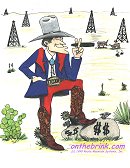


 |
||
|
News Downloads Screen Shots High Scores How To Play Version History Support |
||
 |
||
|
![]()
|
Introduction:
The goal of Oil Tycoon! is to become a billionaire
within ten years. Recently, your rich Texas uncle passed away,
leaving his start-up oil business in your hands. When your uncle
died, he gave you 1 plot of land in Lampassas County with 1 oil
well, 1 refinery, 1 storage unit, 1,000,000 gallons of crude, and
$1,000,000.00. With these and your keen business skills at
your disposal, you attempt to turn this small company into a booming
business.
What's New in
Version 5.0:
Here are some of the new features in this version of
Oil Tycoon!:
Overview:
In general, you can get crude oil by 1)
importing crude from overseas or 2) buying plots of land in several
counties and drills oil wells to extract the oil. Then to make
a profit, you must 1) export the crude overseas or 2) refine the
crude into more usable products, such as gasoline and kerosene, and selling it.
Exporting crude will often times result in a loss of money, since
export prices are so low. Since importing crude is a bit
expensive, you will most likely want to drill oil from land.
Here's a quick explanation of each process:
1. Importing and Exporting Crude: Importing crude often costs as much as $0.40 per gallon and more, while exporting is usually between $0.03 and $0.08 per gallon. Therefore, you cannot continuously import and export crude and expect to make a profit. It is usually a good idea to export when you have an extra amount of crude and you need quick cash.
5. Applying for Loans: If you're ever short of cash, you can
apply for a loan at the bank. Depending on your credit
rating, the bank will allow you to loan up to a certain percentage
of your net worth. You begin the game with the highest credit
rating of 'AAA', which will allow you to loan up to 75% of your net
worth. You can take out a fixed-rate or a variable rate loan,
but the fixed-rate loan will be 3% higher than the current interest
rate. In general, loaning is a better solution if you're tight
on money than exporting crude, except if you have a really low
credit rating. |

